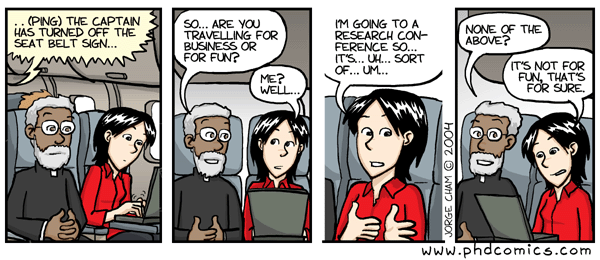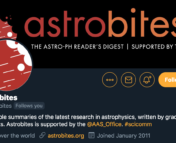Title: Choose Your Own Adventure: Developing A Values-Oriented Framework for Your Career
Author: Lucianne M. Walkowicz
First Author’s Institution: Library of Congress, The Adler Planetarium
Status: Submitted to arXiv, open access
In academia, the traditional metric of choice is publications, in tandem with the number of citations achieved by each publication. However, it’s not necessarily true that an H-index is the most accurate measure of the quality of an astronomer (especially once you consider the biases inherent in citation rates). For example, a survey found that roughly 90% of American Astronomical Society member respondents were actively or had previously been involved in teaching or mentoring more junior astronomy students, indicating that such activities are an integral part of the field. But do all of the astronomers who teach find the act rewarding, or do they consider it a distraction from their research? On the other hand, what if an astronomer who churns out papers while doing little teaching or outreach doesn’t feel fulfilled in their career? This feeling of discontent with the status-quo is far from foreign to many astronomy students, postdoctorates, and faculty members. But how can a budding (or established) astronomer go about achieving their own perception of success and fulfillment in the field?
This Astrobite presents strategies for creating and implementing an individual definition of success as suggested by astronomer Lucianne Walkowicz in this essay on arXiv (adapted from her NSF AAPF Symposium talk at the 2018 Winter AAS meeting). The starting point of these recommendations might feel a bit grandiose, particularly to a young astronomer suffering from imposter syndrome, but it’s necessary in order to clarify the goals you have for your career (and perhaps life in general).
Write a Mission Statement
What am I, a committee? Why does an individual need a mission statement? A mission statement helps to explicitly define your values and establish broad goals. Consider it like a New Year’s resolution: Pick a goal and keep it in your mind, and you’re more likely to adhere to it. But how should you go about formulating your mission statement? In her essay, Dr. Walkowicz recommended considering the following items.
- Think of someone you admire and consider what specific trait creates that admiration.
- What type of work gets you excited and energized?
- How do you want other people to think of you or what would you like your “legacy” to be?
Keeping your answers to these questions in mind, write 1-3 sentences summarizing any common themes you notice, then get someone else to read it! As an example, Dr. Walkowicz reiterates the mission statement of the Adler Planetarium:
“The mission of the Adler Planetarium is to inspire exploration and understanding of the Universe.”
Although these are only a few of the possible thoughts to guide you, there are plenty of other leading questions you can ask yourself if you are less focused on career-planning and are simply interested in bettering yourself. There’s also no requirement that your motivations be high-minded. The goal of this exercise is to identify what is important to you and to establish what you enjoy doing.
Make Conscious Choices
Many people in the job market, including postdoctoral researchers and recent PhD recipients, apply what Dr. Walkowicz refers to as the “buckshot” approach to job applications: Apply to every position you see, regardless of the applicability of the job to your skillset or the job environment to your values. While this may seem like the safest approach when you find yourself with a looming end to your employment, it could also leave you working at an institution whose goals fundamentally conflict with your own, which is poor for your productivity. This illustrates the importance of mindfully choosing which opportunities you decide to accept. In her essay, Dr. Walkowicz recommended consideration of the following items to ensure that the jobs and/or responsibilities you take on are supporting your mission statement as efficiently as possible.
- How well does this opportunity fit with my mission and values?
- What is new and different about this opportunity?
- How long do I think it will take to fulfill this commitment?
- What am I willing to give up for this opportunity?
These ideas are not limited to job applications and can be considered for any opportunity: attending a conference or workshop, joining a committee, or writing for Astrobites, for example. These questions essentially serve to determine if a commitment is worth the trouble. Will the opportunity contribute to or detract from you achieving your goals? Will it take too much time away from work or personal activities that you find fulfilling or necessary to your overall contentment?
Applying Your Framework
The natural next step of this process is in actually applying your values and evaluations to the choices your make. Dr. Walkowicz provides an example of evaluating two of her previous job offers: one at the Adler Planetarium and another at a traditional research university. The Adler, while offering less money, would provide her with the opportunity to interact with the general public and to devote more time to outreach. The research university position was higher paying, but placed great emphasis on publishing at the expense of teaching and outreach. Evaluating these options, Dr. Walkowicz decided that she would rather not spend six years without performing outreach (a stated requirement at the research university in question) because, to borrow a direct quote from her essay, “What if I get hit by a bus in Year Five?”. Obviously her values place special emphasis on engaging with the public but the choices you make in accepting job offers (assuming you are fortunate enough to have a choice) are dependent on your own mission statement. Perhaps you prefer to work extensively with a small group of students rather than many members of the general public, and would choose the research university. There’s no one right answer!
Measuring Your Progress
Okay, so you’ve decided what your value-based goals are, evaluated opportunities according to their usefulness in supporting your goals, and find yourself in the perfect job in the perfect place (or at least hope to find yourself there in the future). How are you to determine whether you are achieving your goals or not? If you’ve elected to prioritize research performance, perhaps you can default to the traditional metrics of success, such as number of published papers, talks, or grant proposals. But if your mission statement is more focused on education or outreach, perhaps you can consider using some of the “squishy” metrics suggested by Dr. Walkowicz, like how often other people come to you for advice or how many non-scientists you are able to communicate with through public events.
While not everyone enjoys participating in these sorts of career-planning exercises, it won’t hurt to establish the distinction between success as defined by academia from a more personal definition. In the process, perhaps you’ll find that you’re more interested in teaching than in doing traditional research. The truly appealing part of these recommendations is that they are completely personalized and, if followed, may help you to make the best decisions for yourself.





Trackbacks/Pingbacks